
Osborne House is a former royal residence in East Cowes, Isle of Wight, United Kingdom. The house was built between 1845 and 1851 for Queen Victoria and Prince Albert as a summer home and rural retreat. Albert designed the house himself, in the style of an Italian Renaissance palazzo. The builder was Thomas Cubitt, the London architect and builder whose company built the main facade of Buckingham Palace for the royal couple in 1847. An earlier smaller house on the site was demolished to make way for a new and far larger house, though the original entrance portico survives as the main gateway to the walled garden.
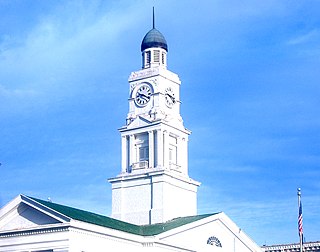
Winchester is a home rule-class city in and the county seat of Clark County, Kentucky, United States. The population was 18,368 at the 2010 census. It is part of the Lexington-Fayette, KY Metropolitan Statistical Area. Winchester is located roughly halfway between Louisville and Ashland.

The Mayo Clinic is a nonprofit American academic medical center focused on integrated health care, education, and research. It employs over 4,500 physicians and scientists, along with another 58,400 administrative and allied health staff, across three major campuses: Rochester, Minnesota; Jacksonville, Florida; and Phoenix/Scottsdale, Arizona. The practice specializes in treating difficult cases through tertiary care and destination medicine. It is home to the top-15 ranked Mayo Clinic Alix School of Medicine in addition to many of the highest regarded residency education programs in the United States. It spends over $660 million a year on research and has more than 3,000 full-time research personnel.
Thomas Jefferson University is a private research university in Philadelphia, Pennsylvania. Established in its earliest form in 1824, the university officially combined with Philadelphia University in 2017. To signify its heritage, the university sometimes carries the nomenclature Jefferson in its branding. It is classified among "R2: Doctoral Universities – High research activity".

Transylvania University is a private university in Lexington, Kentucky. It was founded in 1780 and was the first university in Kentucky. It offers 46 major programs, as well as dual-degree engineering programs, and is accredited by the Southern Association of Colleges and Schools. Its medical program graduated 8,000 physicians by 1859.
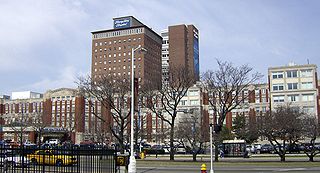
Henry Ford Hospital (HFH) is an 877-bed tertiary care hospital, education and research complex at the western edge of the New Center area in Detroit, Michigan. The flagship facility for the Henry Ford Health System, it was one of the first hospitals in the United States to use a standard fee schedule and favor private or semi-private rooms over large wards. It was the first hospital in the country to form a closed, salaried medical staff. As founder Henry Ford viewed tobacco as being unhealthy, the hospital was one of the first in the United States to institute a total ban on smoking. Henry Ford Hospital is staffed by the Henry Ford Medical Group, one of the nation's largest and oldest group practices with 1,200 physicians in more than 40 specialties.

The Bluegrass Music Hall of Fame & Museum is a bluegrass music museum in Owensboro, Kentucky, United States. The museum has interactive exhibits, posters, costumes, live instrument demonstrations, and International Bluegrass Music Association's Hall of Fame. The museum has 64,000 square feet of exhibits, offices, and venues on three floors. As a non-profit group, the Bluegrass Music Hall of Fame & Museum has raised funds with the help of famous bluegrass musicians such as Ricky Skaggs and Ralph Stanley.

The Lexington History Center once housed several independent history museums in downtown Lexington, Kentucky. It was located in the former Fayette County Courthouse until 2012 when the city closed the building for renovation. Prior to the closing of the building, the Isaac Scott Hathaway Museum moved to a new location on Georgetown Street. The building has since been renovated into a multi-use commercial, tourist, office and event center.

Balfron is a village in the Stirling council area of Scotland. It is situated near Endrick Water on the A875 road, 18 miles (29 km) west of Stirling and 16 miles (26 km) north of Glasgow. Although a rural settlement, it lies within commuting distance of Glasgow, and serves as a dormitory settlement.

King's Daughters Medical Center (KDMC) is in Ashland, Kentucky and is the city's largest employer at over 4,000 employees, generating more than $200 million in payroll a year. It is a locally controlled, not-for-profit 465-bed hospital that offers "cardiac, medical, surgical, pediatric, rehabilitative, psychiatric, cancer, neurological, pain care, wound care and home care" services.

Adsmore is a living history museum located on North Jefferson Street in Princeton, Kentucky. It is the only living home museum in Kentucky. Its name is believed to be derived from numerous additions and renovations over 150 years.
The earliest hospital at Fort Knox Kentucky, was a World War I cantonment building, constructed in 1918 on the site of the Lindsey Golf Course. When the facility burned in 1928, medical services moved to the World War I guesthouse on Bullion Boulevard until a brick hospital was built in 1934 on E Street. In 1940, two mobilization hospitals were constructed along Dixie Street, and were used until the multi-storied concrete structure opened in 1957. Ireland Army Community Hospital closed January 2020. A replacement clinic opened nearby 21 January 2020.
The Temple University School of Podiatric Medicine is a podiatric medical school associated with Temple University in Philadelphia, Pennsylvania. The school is located at 8th and Race Streets in downtown Philadelphia. The school was founded in 1963 as the Pennsylvania College of Podiatric Medicine (PCPM). The school runs the Foot and Ankle Institute, the largest podiatric medical clinic in Philadelphia.
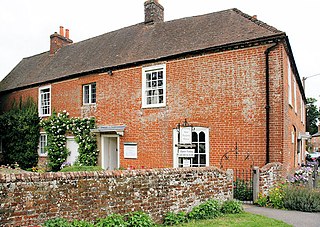
Jane Austen's House Museum is a small independent museum in the village of Chawton near Alton in Hampshire. It is a writer's house museum occupying the 17th-century house in which novelist Jane Austen spent the last eight years of her life. The museum has been a Grade I listed building since 1963.
Heritage Village Museum is a recreated 1800s community in Southwestern Ohio, in the United States. The village contains 13 historic buildings from around the Cincinnati area; they were moved here to save them from destruction. The village is located within Sharon Woods Park in Sharonville, Ohio.
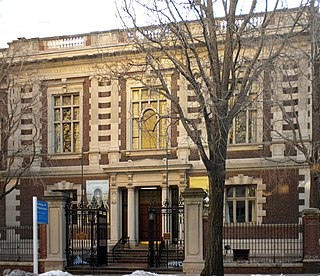
The College of Physicians of Philadelphia is the oldest private medical society in the United States. Founded in 1787 by 24 Philadelphia physicians "to advance the Science of Medicine, and thereby lessen human misery, by investigating the diseases and remedies which are peculiar to our country" and to promote "order and uniformity in the practice of Physick," it has made important contributions to medical education and research. The College hosts the Mütter Museum, a gallery of 19th-century specimens, teaching models, instruments, and photographs, as well as the Historical Medical Library, which is one of the country's oldest medical libraries.
Stuart Robinson School was a settlement school in Blackey, Letcher County, Kentucky, established in 1913 as a Presbyterian mission. It closed in 1957, after graduating its last class in 1956.
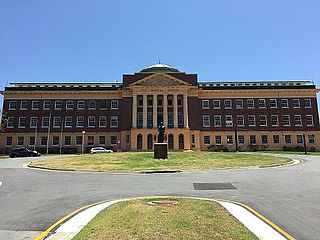
University of Queensland Mayne Medical School is a heritage-listed university building at 288 Herston Road, Herston, City of Brisbane, Queensland, Australia. It was designed by Raymond Clare Nowland and built from 1938 to 1939. It is also known as University of Queensland Medical School. It was added to the Queensland Heritage Register on 24 June 1999.

Roberts Clinic, a historic Colonial Revival building completed in 1937, was the first medical facility in Austin, Texas established to provide hospital rooms and care exclusively for the comfort of American Black patients. The practice offered treatment for acute and chronic illnesses, preventive treatment, minor surgeries, labor, delivery, and abortion services through the 1960s.















